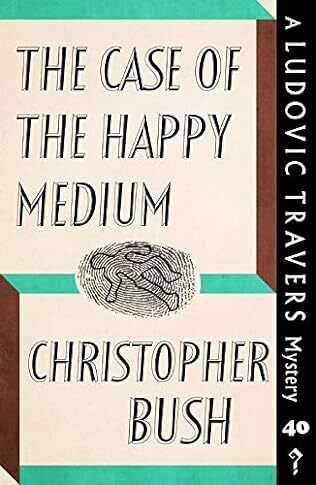The Case Of The Happy Medium

A review of The Case of the Happy Medium by Christopher Bush – 240621
This is another case of a thematic link between two books sitting next to each other in my TBR pile. You might say there is some other force guiding my choice of reading choice. Like Christie’s Dumb Witness, The Case of the Happy Medium, the fortieth in Bush’s long running Ludovic Travers series, originally published in 1952 and reissued by Dean Street Press, has a séance as a pivotal moment in the plot.
The eponymous happy medium is Madame Petriff, a spirit guide for those lucky enough to be recommended. Travers’ wife, Bernice, is among the chosen few and she persuades her somewhat reluctant husband to attend a meeting which proves to be an unsettling affair. The plus point is that it enables Bush to get his sleuth to meet all the people who are to feature in the story, which, as one comes to expect from a Bush mystery, is a complicated affair with lots of twists and turns.
There is an air of inevitability about her murder but another of the attendees, Hather, an author who specializes in writing about spiritual matters, is also found dead in his flat. His death looks superficially like suicide, an interpretation of the facts that the local police led by Trage and, later, Wharton, the big cheese at the Yard who uses Travers on a consultancy basis, are willing to accept. Travers, though, is not convinced because there are a number of small and inconvenient facts that do not fit in with that thesis including a Turkish rug that seems to have been exchanged, a suicide note written on a pad rather than on paper in the desk and unsigned, and no acknowledgement of his girlfriend, Phyllis Parting, in the will.
Both Wharton and Travers are ad idem that the two deaths are connected and that there was something fishy going on linked with the spiritualist set up, its magazine run by Corbel and a rather oleaginous importer, Maroulis, a theory reinforced by the discovery of a red notebook with initials and numbers with crosses and ticks against some of the entries. And why did a couple of habitués of the circle had to have stays at nursing homes?
In this case at first blush Travers seems unusually slow-witted and off pace. It is fairly obvious that Maroulis is running a drugs operation using the spiritual set up to recruit gullible customers, a fact that even Wharton quickly picks up. Rather than working together and sparring off each other, Wharton rather sidelines Travers, leaving him to follow specific and seemingly unimportant aspects of the general enquiry and The Old General has the satisfaction of bringing the case to a conclusion without much input from the theorizing amateur.
Travers, though, is nothing if not persistent and believes that Wharton has, as usual, got the wrong end of the stick. He is particularly interested in another writer, Winster, who had accused Hather of plagiarism and was appalled by Hather’s treatment of his wife, Ursula, and develops an alternative and radically different reconstruction of Hather’s demise.
This is another case where grim realism obtrudes into what was once a cosy world of genteel murders. Perhaps as befits a case involving drug traffickers and dealers, there is a greater sense of personal danger running through the tale with Travers tailed after asking to many questions at the séance, is shot and wounded as he has a hand in the arrest of Wharton’s preferred suspect and has a gun pulled on him as he reveals his interpretation of Hather’s death to his suspect. In his self-defence he bring the case to a rather abrupt end.
As often with a Bush murder mystery seemingly disparate bits of information and odd clues are brought together to produce a satisfying whole. There are enough clues to allow the reader to draw their own conclusions as to what really went on. Travers worries away at the details and while no longer a flamboyant sleuth gets there in the end after a slow start.
The séance is the highlight of the book for me and the means by which Maroulis’ office is connected to that of Corbel is ingenious. Bush produces a satisfying, enthralling, occasionally humorous read, a great way to pass a few hours.



